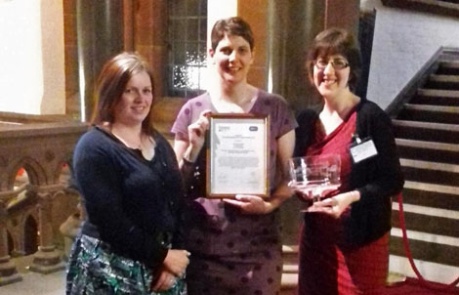Monday 1st May 2017, 2:00pm
A leading course in animal welfare education has been recognised for its contribution in driving innovation in animal welfare for more than quarter of a century.

The University of Edinburgh and SRUC Masters in Applied Animal Behaviour and Animal Welfare was awarded the RSPCA/BSAS 2017 Award for Innovative Developments in Animal Welfare, for its role helping improve the lives of farm, companion, research and wild animals.
The course, which has been running for more than 25 years, has seen more than 600 students graduate, many of whom have gone on to make significant contributions to the progression of global animal welfare.
Its alumni include researchers, educators, government workers, vets and members of non-governmental and industry organisations.
"This year we have picked a course rather than an individual for the award, as we wanted to recognize the great contribution they make towards animal welfare.”
Presenting the award, BSAS President, Professor Liam SinclairTamsin Coombs and Susan Jarvis, course directors of the MSc in Applied Animal Welfare and Animal Behaviour, and Fritha Langford, course director of the MSc programme in International Animal Welfare, Ethics and Law, collected the award on behalf of the course.
“We are delighted to receive this award for recognising the impact of animal welfare. Originally the idea of the course came from Professor Wood-Gush who saw the requirement for post-graduate research.
“We would like to thank all of our students who are practicing animal welfare in the real world.”
Dr Jarvis, Course DirectorThe course was first introduced at Edinburgh in 1990 by Professor David Wood-Gush, one of the first scientists to investigate the effects of large-scale farming on animals. While its background was in farm animal welfare, it has gone on to include all aspects of companion, laboratory and wild animal welfare.
In 2012 it also launched an additional online MSc which specialises in international animal welfare, ethics and law.
The programme is taught by academics with strong backgrounds in research, but also includes contributions from ‘front-line’ professions working in farm, laboratory and zoo environments.
Graduates with animal welfare training at Edinburgh have gone on to contribute significant changes to the lives of animals under human care. For example, one graduate includes the chief executive of McDonalds - a company which now adopts Freedom Food/RSPCA Assured standards for its UK-based enterprises.
Following the success of the programmes, additional initiates have been launched including two MOOCs (Massive Open Online Courses), which saw 59,502 learners signing up to a free online course on animal welfare and behaviour. Of these, 13,798 (23%) students came from emerging economies - helping to reach students vulnerable to educational deficits.
The recognition of animal welfare and behaviour science has also led to the development of the Jeanne Marchig International Centre for Animal Welfare Education (JMICAWE) which aims to improve the quality of life for all animals through education, training and by influencing policy at the highest level.